Hotel Front Desk Software: Complete Guide and 6 Top Systems
Aug 4, 2025
 Mika Takahashi
Mika TakahashiPopular Categories
Hotel Technology & InnovationHotel Operations OptimizationDigital MarketingIndustry TrendsRevenue ManagementHospitality Industry
Popular Categories
Trending Post
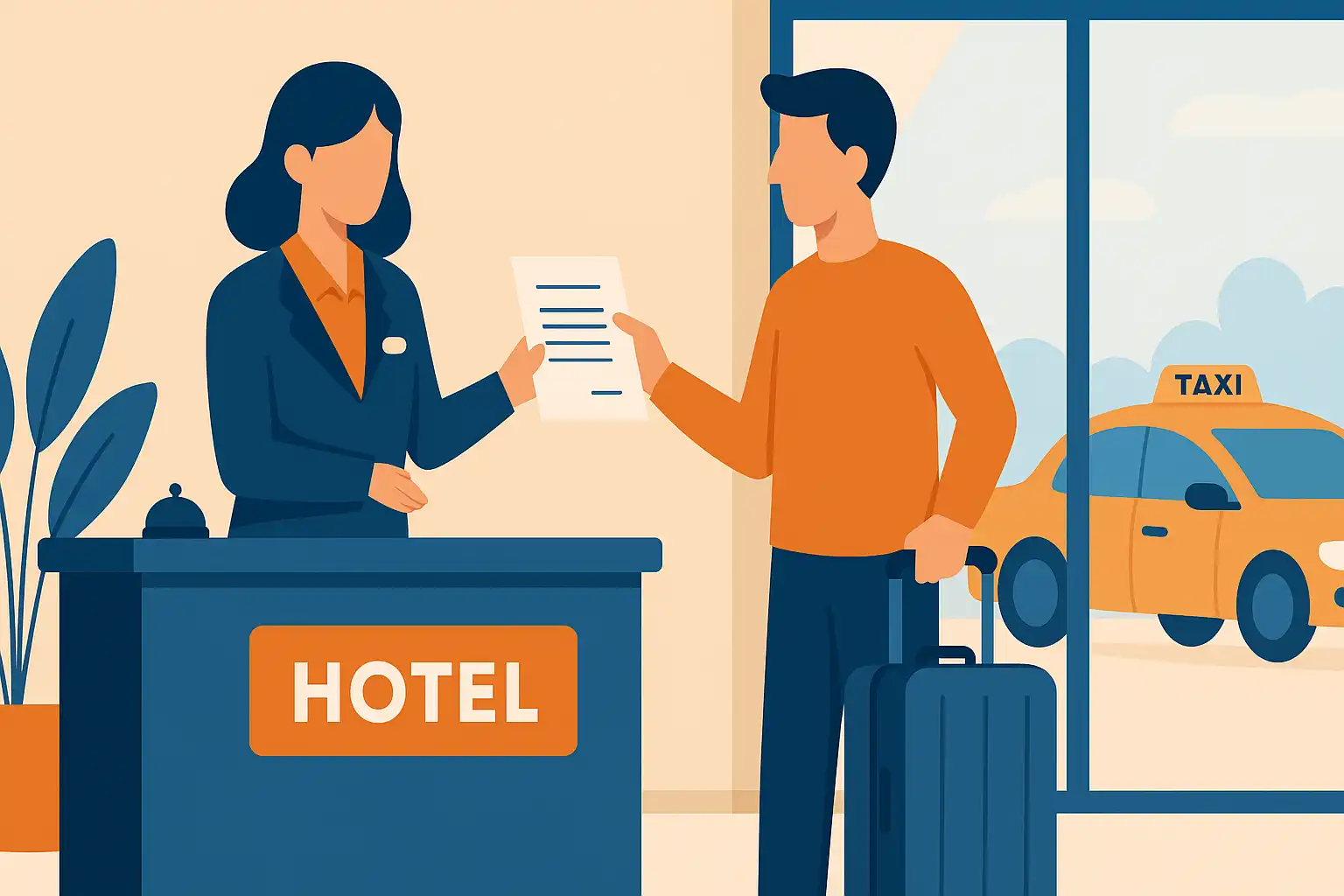
Hotel Walk Letter Template: Professional Guest Communication
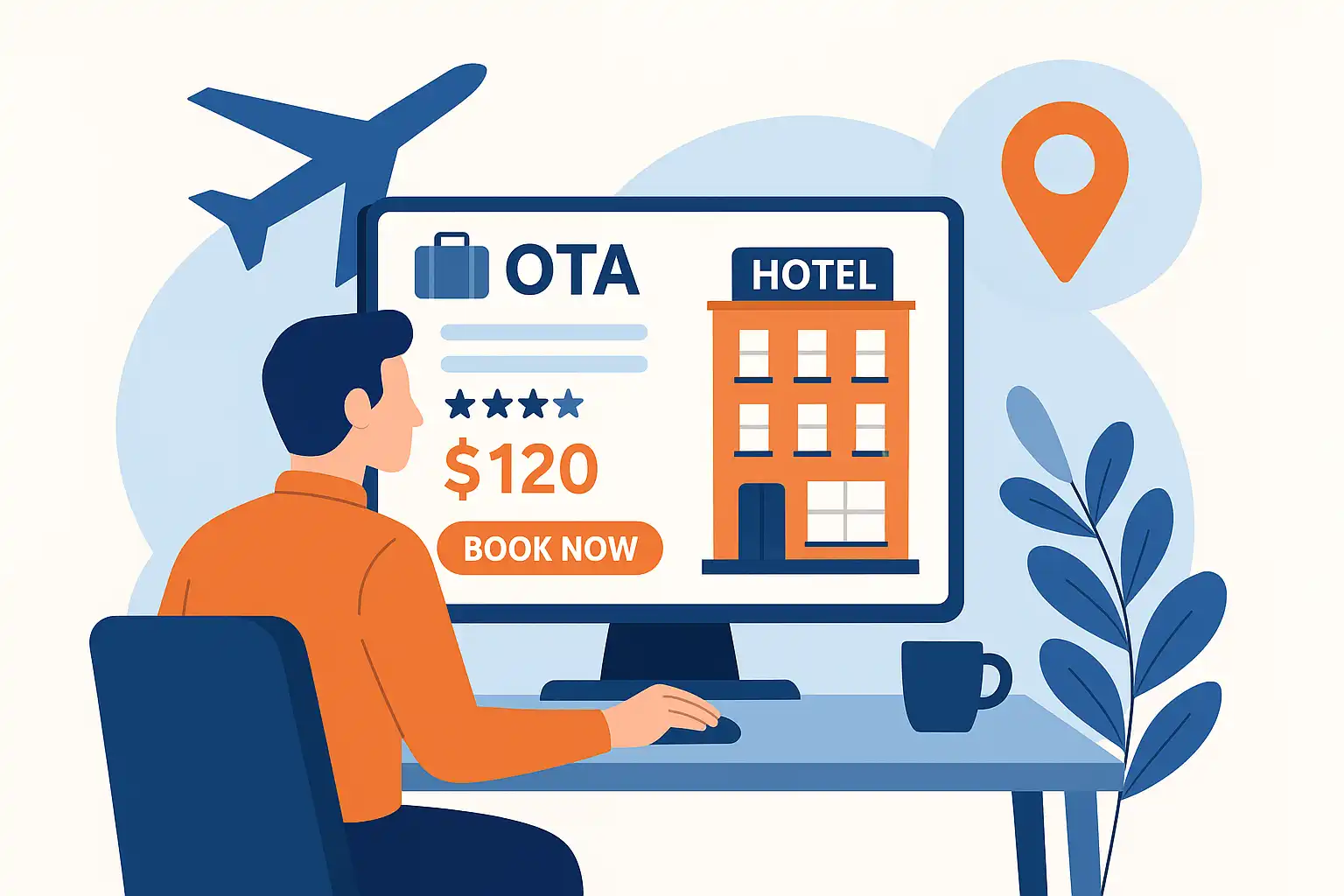
Online Travel Agents: What They Are and How They Work
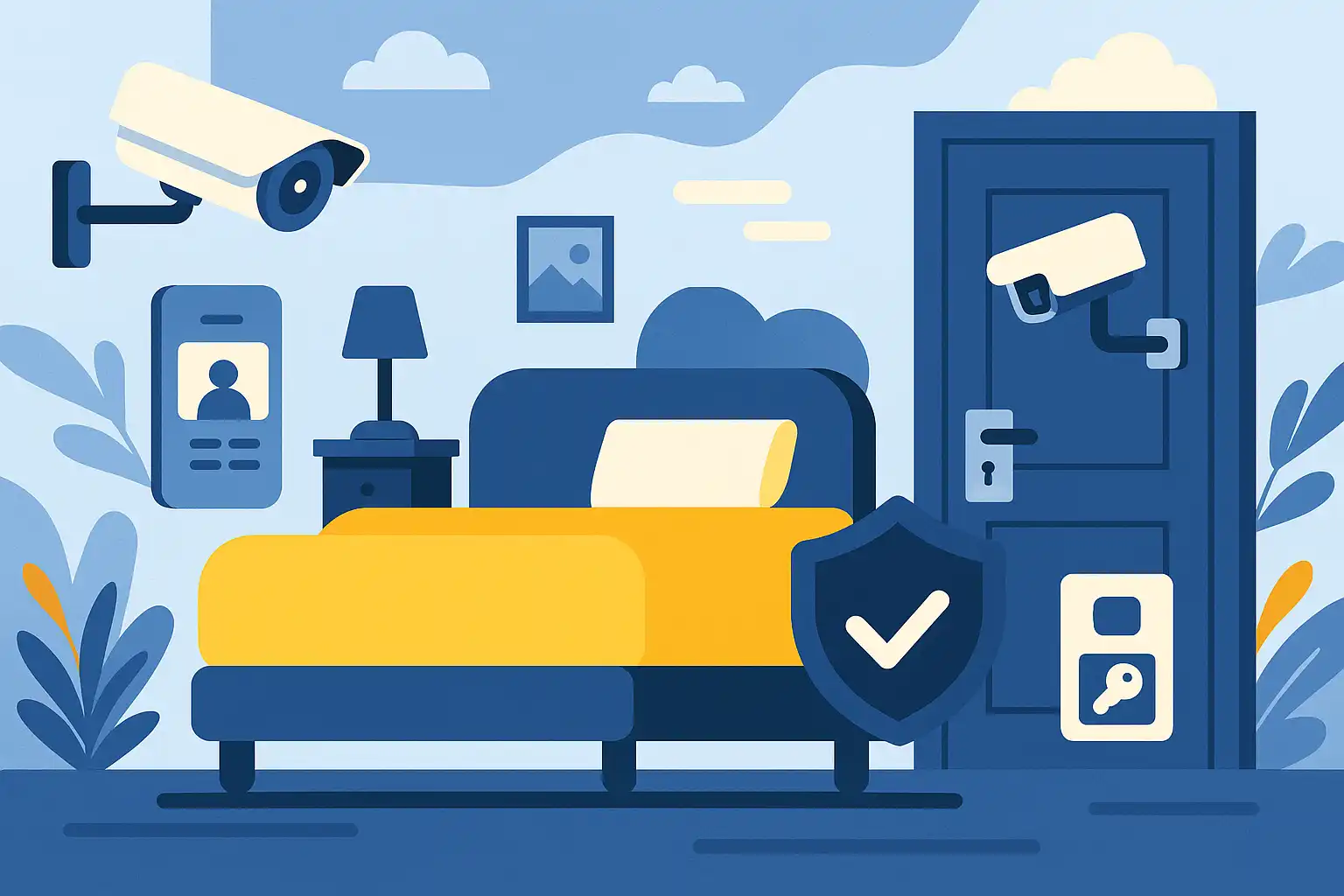
Hotel Security Systems: Modern Protection Solutions

Hotel Advertising: Complete Guide to Boost Bookings and Revenue
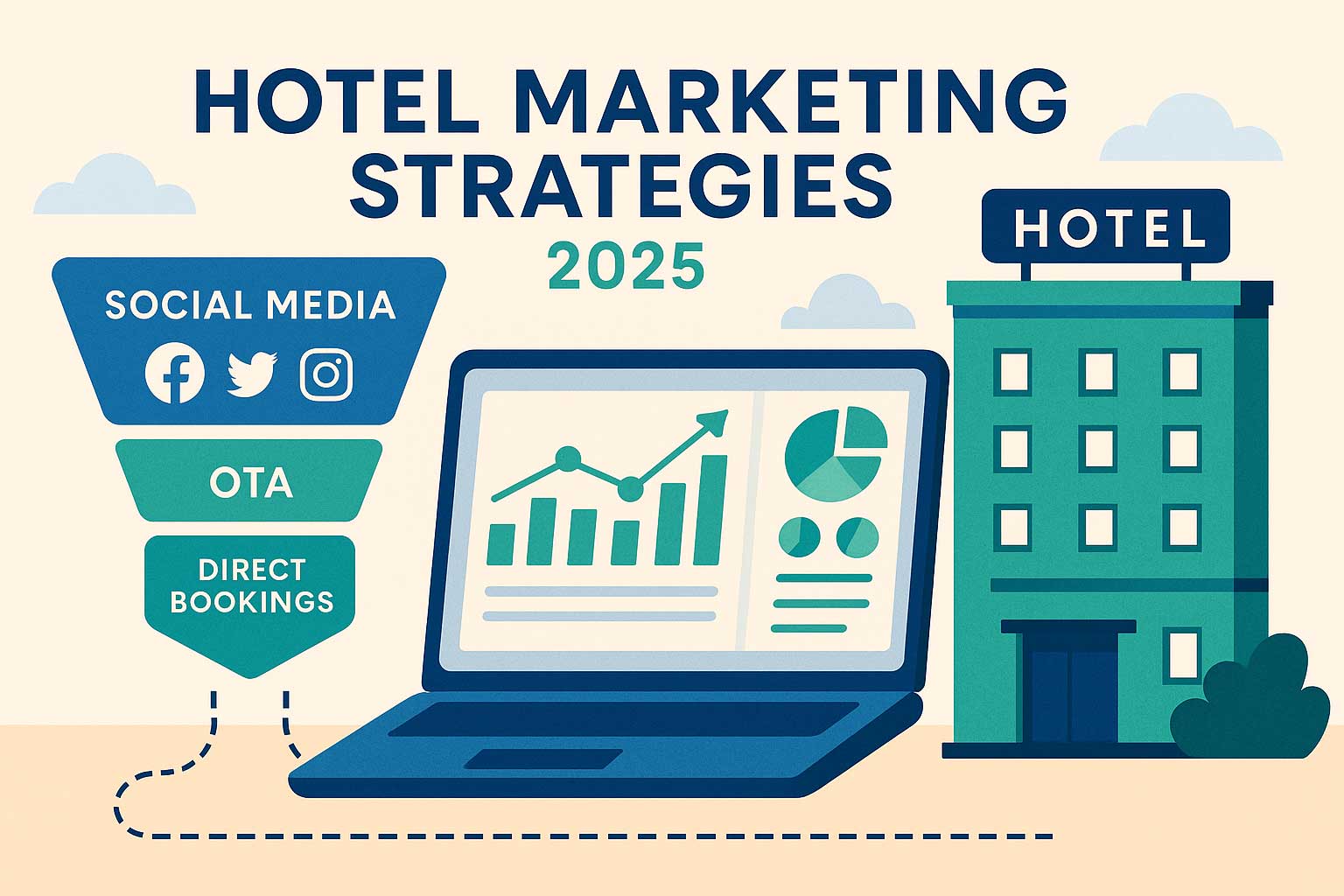
25 Hotel Marketing Strategy Ideas for 2025: Complete Guide

AI Reservation Agent: Revolutionizing Hotel Booking and Guest Experience

PMS Communication: Streamlining Property Management Through Effective Guest Messaging
Table of contents
The hospitality world is embracing digital innovation faster than ever, with more than half of hotels now using cloud-based technology to streamline their daily operations. At the heart of this transformation is hotel front desk software—a powerful tool designed to make guest interactions smoother, simplify booking management, and help hotel staff tackle everyday tasks with ease.
Unlike broader property management systems that juggle many hotel functions, front desk software focuses on the essentials: welcoming guests, managing room assignments, handling payments securely, and keeping communication flowing effortlessly. This focused approach helps hotels elevate service quality while running their operations more efficiently.
In this guide, we’ll explore everything you need to know about hotel front desk software—from its must-have features and how to implement it, to security tips and the latest trends shaping the future of hospitality management.
What is hotel front desk software?
Think of hotel front desk software as a specialized branch of property management systems, crafted specifically to simplify and automate the core front desk duties in hotels, motels, B&Bs, vacation rentals, and other hospitality businesses. It acts as the nerve center for guest-facing tasks that once involved mountains of paperwork and manual effort.
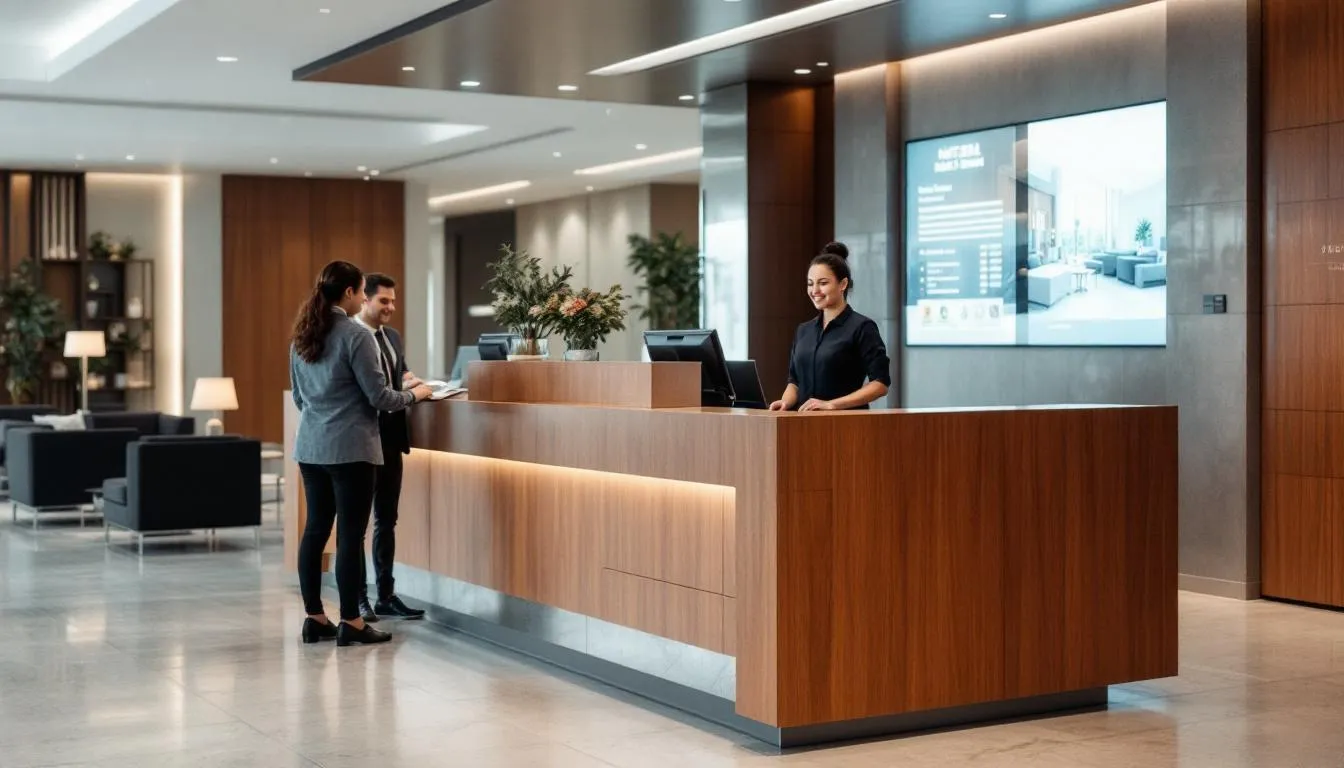
The key difference between front desk software and full-scale property management systems (PMS) is scope. While a PMS covers everything from back-office accounting to maintenance, front desk software zeroes in on guest services and reservation handling.
Core functions of front desk software
Front desk software brings together several connected features that work in harmony to create smooth guest experiences:
Check-in and check-out processing is the backbone here. Digital workflows replace tedious paperwork with handy tools like ID scanning, e-signatures, and mobile check-in options. Many systems now offer contactless check-ins through kiosks or apps, cutting wait times and making guests feel right at home.
Reservation management keeps bookings in sync across all channels—whether direct, OTA, or phone—so double bookings become a thing of the past. Staff get instant updates on room availability, making it easy to keep things running smoothly.
Payment processing integrates multiple payment options through secure gateways, staying compliant with PCI DSS standards. It handles everything from deposits to refunds, posting charges automatically to guest accounts.
Guest profile management stores detailed info on guest preferences, past stays, and special requests. This data helps hotels personalize service and run targeted marketing campaigns that encourage guests to come back.
Property types that benefit
Independent hotels love front desk software because it offers enterprise-level features without overwhelming complexity. Boutique hotels can use guest data to craft unique, personalized experiences that set them apart from big chains.
Vacation rentals and short-term rental owners manage multiple properties from one dashboard, coordinating guest communications and check-ins across locations. Integration with channel managers is especially helpful when listing on multiple platforms.
Hotel chains rely on front desk software to standardize operations across properties while keeping centralized control and reporting. Modern solutions scale easily from small groups to large hospitality enterprises.
Essential features of hotel front desk software
Today’s front desk software packs features that boost guest service and streamline hotel operations. Knowing what these are helps property managers pick the best hotel management software for their needs.
Real-time room availability and reservation management
Instant syncing across all channels prevents overbookings and maximizes occupancy. Visual dashboards show room status and housekeeping updates at a glance. An integrated booking engine lets guests book directly on your website, reducing dependence on third parties. Group bookings get special attention with modules designed for block reservations and pricing.
Guest profile management and personalization
Systems keep track of guest preferences—like favorite room types or special occasions—so hotels can tailor services and boost satisfaction. VIPs and special events get flagged for extra care. Integration with CRM systems enables targeted marketing and loyalty programs.
Integrated payment processing and financial management
Secure payment options handle multiple methods while ensuring PCI DSS compliance. Automated billing posts charges for rooms and extras directly to guest folios. POS integration adds charges for on-site services automatically. Multiple gateways support international payments and currency conversions.
Automated check-in and check-out processes
Mobile check-in lets guests register before arrival and receive digital or contactless keys. Self-service kiosks offer 24/7 check-in without staff intervention. Express check-out allows guests to review bills on mobile or in-room devices, with automatic receipts and loyalty updates.
Room assignment optimization
Room assignments consider guest preferences, housekeeping status, maintenance needs, and revenue management. Housekeeping integration ensures only clean rooms get assigned. VIPs and loyalty members may receive automatic upgrades.
Multi-channel booking and distribution management
Channel manager integration keeps rates and availability aligned across OTAs, vacation rentals, and direct channels, preventing overselling. Dynamic pricing tools adjust rates based on demand and competition. Direct booking incentives encourage guests to book straight through the hotel.
Guest communication and engagement tools
Automated messaging handles pre-arrival, in-stay, and post-departure communication via email, SMS, and apps. Guests get check-in instructions, local tips, and upsell offers before arrival. In-stay services include real-time requests and feedback collection. Post-stay messages thank guests, request reviews, and promote future stays.
Benefits of implementing front desk software
Operational efficiency improvements
Automating manual tasks can cut check-in times by up to 60%, freeing staff to focus on delivering great guest service. Automation boosts productivity, reduces errors, and provides instant access to guest and room info for faster decisions.
Enhanced guest experience and satisfaction
Detailed guest profiles enable personalized touches that raise satisfaction scores. Mobile check-in and express check-out cut down wait times, while automated alerts help staff anticipate guest needs, creating memorable stays that bring guests back.
Revenue optimization and growth
Dynamic pricing can increase revenue per available room (RevPAR) by 10-15%. Automated upselling and targeted offers based on guest preferences boost sales of extras. Integrated booking engines improve direct bookings by up to 25%, cutting commission costs.
Error reduction and accuracy improvements
Automated bookings and billing reduce manual errors by up to 90%, preventing disputes and saving time. Real-time inventory syncing stops overbookings, and accounting integrations smooth out financial processes.
24/7 operational capability
Self-service kiosks and mobile apps extend front desk services beyond regular hours. Automated communications keep service consistent during busy times or staff shortages. Emergency protocols benefit from automated alerts and guest assistance features.
Better inventory and resource management
Real-time housekeeping updates prevent double bookings and keep room status accurate. Maintenance tracking avoids assigning rooms under repair. Inventory management optimizes supplies for guest needs and events.
Key considerations when choosing front desk software
Picking the right hotel front desk software means balancing immediate needs with long-term goals. Property managers should weigh features, cost, and compatibility to find the best fit.
Hotel size and property type
Independent hotels want enterprise features without complexity or high costs. Boutique properties need strong personalization and communication tools. Hotel chains look for scalable solutions with centralized control. Vacation rentals require multi-unit management and remote check-in.
Integration and compatibility
Software must work smoothly with existing property management, accounting, and operational systems to avoid data silos. Channel manager integration is key for managing distribution across OTAs and direct channels. Compatibility with revenue management and POS systems is also important.
Scalability
Solutions should grow with your business—adding rooms, services, and features without requiring a full system swap. Modular design, multi-property support, and user capacity are essential.
User interface and training
An intuitive interface cuts training time and errors. Mobile access speeds up responses. Customizable workflows help adoption. Good training resources support smooth rollouts.
Deployment options
Cloud-based systems offer remote access, automatic updates, and lower IT costs. On-premise solutions give more data control and suit properties with special security or connectivity needs. Hybrid models blend both advantages.
Customer support
Responsive tech support, thorough onboarding, regular maintenance, and clear documentation are vital for smooth operations.
Pricing models
Subscription plans spread costs and include updates and support. Pricing may be per room, property, or user. Commission-based models charge a percentage of bookings. One-time licenses have upfront fees plus maintenance. Watch for hidden costs like implementation, training, integrations, and hardware.
Integration capabilities and API access
Hotel operations today depend on connected systems sharing data seamlessly. The integration power of front desk software determines how well properties optimize workflows, reduce manual work, and deliver great guest service with unified technology.
Channel manager integration
Syncing room availability and pricing across platforms like Booking.com, Expedia, Hotels.com, and Airbnb is a must. Real-time updates prevent overbooking and maximize revenue. Rate management supports dynamic pricing and rate parity. Commission tracking and analytics help fine-tune distribution.
Property management system connectivity
Linking front desk software with PMS ensures smooth data flow between guest services and back-office tasks, eliminating duplicate entries. Financial integrations automate charge postings and reconciliation. Maintenance and HR systems integration streamlines work orders and staff management.
Housekeeping management systems
Two-way integration gives real-time room status updates for efficient assignments and reporting. Automated work orders coordinate maintenance. Quality tracking and inventory management keep cleaning standards high and supplies optimized.
Revenue management tools integration
Dynamic pricing adjusts rates based on forecasts and competitor moves. Demand forecasts help staff and service planning. Group booking and upselling tools simplify reservations and boost revenue.
Customer relationship management integration
Guest profile syncing keeps data current across marketing, sales, and operations. Marketing automation enables targeted campaigns. Loyalty programs encourage repeat visits. Guest feedback integration consolidates reviews for improvements.
Point-of-sale systems integration
Connecting with restaurants, spas, retail, and events lets charges post directly to guest folios, simplifying billing and checkout.
API access and custom integrations
Open APIs allow custom links with specialized software, supporting unique needs. Third-party connections enable best-in-class guest engagement and analytics tools. Data export supports advanced reporting. Strong API access future-proofs your tech and boosts efficiency.
Cost factors and pricing models
Understanding the full cost of front desk software means looking beyond licenses to implementation and ongoing expenses for a clear ROI picture.
Subscription-based pricing structures
Monthly subscriptions usually range from $2 to $8 per room, covering updates and support. Annual plans offer discounts but require upfront payment. Per-property pricing suits multi-property managers, ranging from $50 to $500 monthly. User-based pricing charges per staff member, typically $15 to $50 monthly. Tiered plans offer features at different price points—from basic to premium.
Commission-based pricing models
Booking commissions range from 2% to 5% of room revenue, aligning vendor and property success but can add up with volume. Channel management fees may apply on OTA bookings. Payment processing fees average 2.5% to 3.5% per transaction, negotiable for high volumes. Commission models fit properties with fluctuating occupancy.
One-time licensing and implementation costs
On-premise licenses cost $1,000 to $10,000 per property. Setup fees for configuration, data migration, and training vary widely ($2,000 to $15,000). Data migration depends on volume and complexity ($500 to $5,000). Training boosts productivity but costs $1,000 to $5,000.
Hidden costs and additional fees
Payment gateway fees average 2.9% plus $0.30 per transaction. Premium features like revenue management or API access may add $50 to $500 monthly. Third-party integrations can cost $2,000 to $20,000. On-premise support contracts run 15-25% of licensing annually. Hardware upgrades may require $2,000 to $10,000.
Return on investment calculation
Automation can save 2-4 staff hours daily, cutting labor costs by $15,000 to $30,000 yearly. Errors drop 50-90%, avoiding costly guest relocations. Revenue can rise 5-15% through dynamic pricing and upselling, adding $13,000 to $40,000 annually for a 50-room property. Guest satisfaction improvements boost repeat bookings by 10-25%. Operational costs fall by $2,000 to $8,000 annually.
Budget planning and cost optimization
Focus on essential features first, adding advanced ones as needed to control costs. Negotiate contracts for discounts on annual payments, multi-year deals, or volume pricing, saving 10-25%. Compare vendors thoroughly, including all fees. Choose scalable solutions that grow with your business.
Top 6 Hotel Front Desk Software Systems
Finding the right hotel front desk software is key to running smooth operations and delighting guests. Here are six top contenders, starting with Prostay.
1. Prostay
Prostay offers an all-in-one, user-friendly platform that covers reservation management, guest profiles, housekeeping, and payment processing. It supports multi-channel distribution, making it ideal for independent hotels and boutique properties looking to simplify operations and grow seamlessly.
2. WebRezPro
WebRezPro is a cloud-based system with flexible reservations, group bookings, folio splitting, and real-time housekeeping updates. It integrates with POS systems and offers customizable reporting for operational control.
3. Cloudbeds
Cloudbeds features an intuitive dashboard for reservations, guest communication, and payments. It connects with major OTAs via channel management and supports dynamic pricing, suitable for properties of all sizes.
4. Oracle Hospitality OPERA Property Management System
OPERA is a scalable choice favored by large hotels and chains. It offers advanced guest profiles, loyalty management, and strong integration with financial and third-party systems, though it has a steeper learning curve.
5. RMS
RMS provides a visual calendar for room assignments, inventory management, and integrated payment processing. It supports guest feedback and channel management, making it a solid option for mid-sized hotels and resorts.
6. RoomRaccoon
RoomRaccoon combines front desk software with a booking engine and channel manager. It offers easy check-in/out, AI-driven pricing, and automated upselling, perfect for small to medium hotels aiming to boost direct bookings and revenue.
These systems cater to diverse property needs, helping hotels manage operations efficiently while enhancing guest satisfaction.
Conclusion
Hotel front desk software has come a long way from a basic tool to a powerful platform that drives guest satisfaction, operational efficiency, and revenue growth. Moving from manual processes to smart, integrated systems marks a major leap forward for hospitality management.
When considering front desk software, properties must weigh features, integration, security, and scalability. The best solutions balance power with ease of use, ensuring advanced tools make daily work smoother, not more complicated.
Investing in quality front desk software pays off through lower labor costs, happier guests, higher revenues, and greater accuracy. Hotels that choose wisely and implement carefully see the fastest, biggest benefits.
As technology advances with AI, contactless options, and predictive analytics, front desk software will only become more vital. Hotels embracing these innovations while focusing on exceptional guest service will stand out in a competitive, fast-evolving market.
Success isn’t about picking the flashiest system but finding one that fits today’s needs and grows with tomorrow’s goals. With thoughtful choice, solid implementation, and ongoing tuning, hotel front desk software becomes the foundation for lasting hospitality success.
